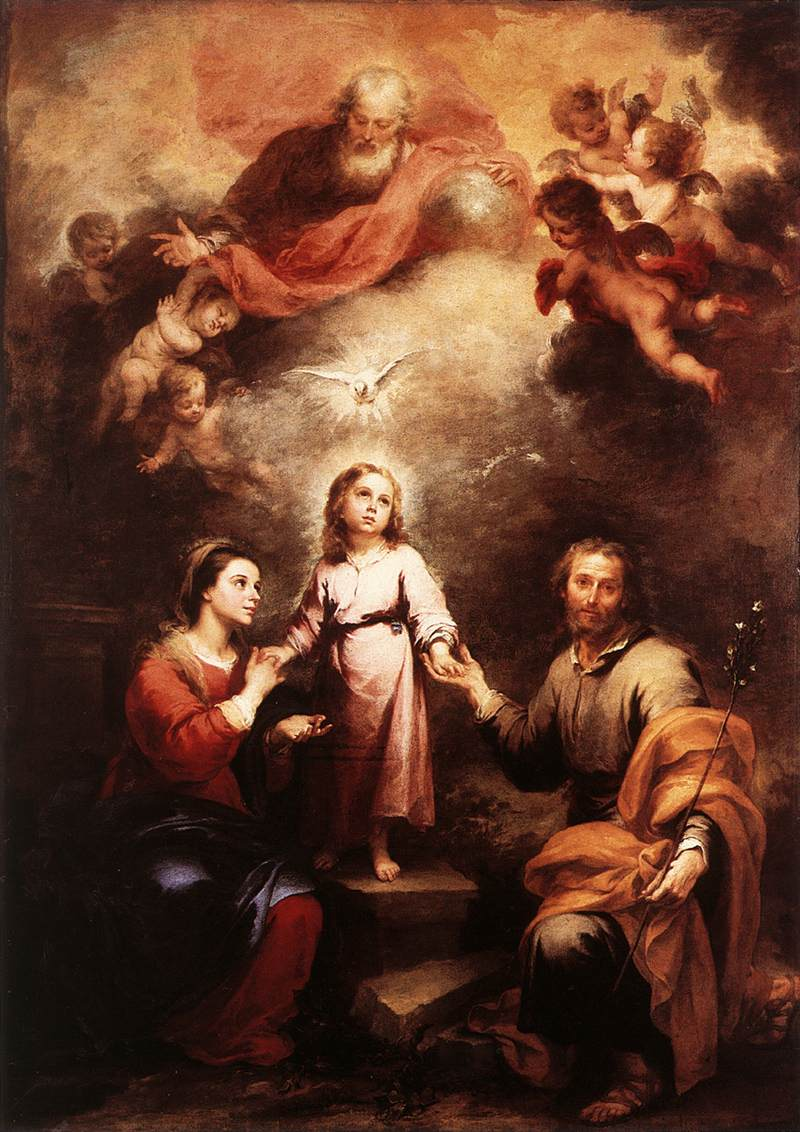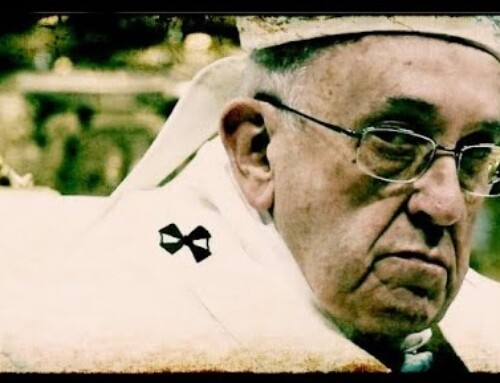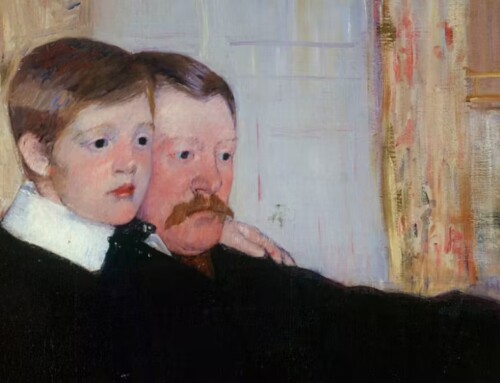“And seeing him, they wondered. And his mother said to him: Son, why hast thou done so to us? Behold thy father and I have sought thee sorrowing.” (Luke 2:48)
In his book “The Fatherhood of St. Joseph,” Joseph Mueller, S.J. described how St. Joseph, as head of the Holy Family, was “thus endowed with the authority this position conferred on him,” and consequently “is seen to have a special relation all his own to God the Father.” He continued: “He was therby in a special way, and incomparably more than any other creature, a representative and reflected image of the heavenly Father.”
But in what “special way” does St. Joseph represent the image of our Heavenly Father? Mueller continued: “[The] Father of Jesus in the proper and fullest meaning of the word is the heavenly Father, the First Person of the Trinity. He is his natural Father…” But through the expressed command of God the Father, St. Joseph became “His representative on Earth.” And within St. Joseph, God the Father instilled a love of the child Jesus that was of “an incomparable higher and more perfect degree than the best natural father would have for his only son.”
“Saint Joseph, father of Christ, is also your father and your lord. Ask him to help you.” – St. Josemaria Escriva
This theology of St. Joseph is completely compatible with the love God the Father has for humanity. Because, although God the Father is not our biological parent, He still loved us more than any natural Father could – in that He infinitely humbled Himself, became a man like us, and died a most ignominious death. “For God so loved the world that he gave his only Son, that whoever believes in him should not perish but have eternal life.” (Jn 3:16) In a similar way, just as God in heaven is our Father, so is St. Joseph our foster-father. “He was obedient to them.” The love of St. Joseph for Jesus was so great, that God condescended to become a Man and to be obedient to a mere mortal human being. And thus, just as the foster-father of Jesus loved and protected the source of Man’s salvation, as does St. Joseph care for those whom his precious Son died so willingly.
St. Joseph was called by God to serve the person and mission of Jesus directly through the exercise of his fatherhood. It is precisely in this way that, as the Church’s Liturgy teaches, he “cooperated in the fullness of time in the great mystery of salvation” and is truly a “minister of salvation.” – St. John Paul II
“Joseph, son of David, do not be afraid to take Mary your wife into your home.” And because St. Joseph overcame his anxiety and fears, and protected the Blessed Virgin Mary when she was with Holy Child, he is a particularly efficacious advocate and guardian for those who are most vulnerable. As he protected the infant Jesus from the murderous rampage of King Herod, St. Joseph will never abandon those who put their trust in him.
According to the Litany of St. Joseph, among his titles are:
“Solace of the afflicted,”
“Hope of the sick,”
and “Terror of demons.”
For those who are suffering with same-sex attraction, in St. Joseph – you will find consolation. For those weighted down by the sickness of heart, following a life filled with disappointment and devastation that is so inherent within the false promises of homosexuality, you will discover a new found Faith in the Love surrounding the Holy Family – a true model of happiness that Our Lord intended for all his children. Lastly, anyone who attempts to reject a false identity, that so many have claimed is an undeniable reality, will experience intense persecutions and temptations fomented by the devil; but when St. Joseph is at our side – all the powers of hell will not stand against him.
To the fatherless, the abandoned, the neglected, the abused, and the bullied, St. Joseph will be the Father, the friend, the male role model in your life that you never had. Just as he would not abandon Our Lady, he will never forsake us. As he fought to save the lives of Mary and the Christ-child, he will battle every demon that seeks to destroy our soul. And as he sought in sorrow for the boy Jesus, St. Joseph will never give up until he is reunited with those he dearly loves.
As a child, what little bit of traditional Catholic religious imagery I was exposed to belonged to my father who, when he emigrated from Italy as a young man, brought a few cherished items along with him. One of them, was a small statue of St. Joseph holding the Christ child; there have been many variations on this particular image, usually with a very upright, masculine, and sturdy looking St. Joseph tenderly pressing the infant Jesus to his chest. These statues are somewhat evocative of the famous “ancient prayer” to St. Joseph which includes the following:
“O St. Joseph, I never weary contemplating thee and Jesus asleep in thine arms. I dare not approach while He reposes near thy heart. Press Him in my name and kiss His fine head for me…”
But as a boy, I had no knowledge of this prayer. Yet, the intimacy between father and son, as witnessed in this stanza, and in the statue itself, was extremely off-putting to me – almost revolting. For, at the time, my increasingly severe feelings of alienation from men and especially from my male peers at school, caused me to long for masculine affirmation, affection, and physical contact, but simultaneously, men and other boys became something to be feared – because they had rejected me and were the source of constant schoolyard tortures.
Then, as I got a little older, the only safe-space in which to explore my desire for same-sex touch was through gay pornography. In that fantasy world of ultimate male-bonding, a constant scenario was that of the older man “daddy” initiating the younger more inexperienced “son.” How I longed to be that guy – to be held, kissed, and loved by another man.
 As soon as I could leave home, I went in search of my “daddy.” My first night in a gay bar, I was immediately set upon by a number of mature handsome men who wanted to buy me drinks. Here I was, the kid no one wanted on their team, the boy who was always relegated to having lunch at the girl’s table, the high-school freshman that the macho senior boys made fun of – their near mirror images wanted to be with me. I was euphoric. And, when I was with someone, it felt incredibly good. Through this union of bodies, in a strange way. I thought I found God. The pain of the past drifted away with the rush of dopamine and testosterone; for a moment I was lifted to a place that seemed like heaven. I felt transformed. Only, once that chemical spike subsided, I was still the same lonely boy; now cold and soiled. As much as a tried to find a savior who could take it away – no one ever could.
As soon as I could leave home, I went in search of my “daddy.” My first night in a gay bar, I was immediately set upon by a number of mature handsome men who wanted to buy me drinks. Here I was, the kid no one wanted on their team, the boy who was always relegated to having lunch at the girl’s table, the high-school freshman that the macho senior boys made fun of – their near mirror images wanted to be with me. I was euphoric. And, when I was with someone, it felt incredibly good. Through this union of bodies, in a strange way. I thought I found God. The pain of the past drifted away with the rush of dopamine and testosterone; for a moment I was lifted to a place that seemed like heaven. I felt transformed. Only, once that chemical spike subsided, I was still the same lonely boy; now cold and soiled. As much as a tried to find a savior who could take it away – no one ever could.
I moved from one man to another, some I stayed with for awhile, a few – for only minutes. But I always ended-up alone. Finally, I gave up, and I decided that dying would be easier than this. One day, I met a man who put his hand on my shoulder. I instinctively recoiled. But I was too tired to move. He picked me up, and carried my lifeless body to his childhood home. He quickly disappeared. There, I was tended by a woman and her husband. Somewhere in the house, I could intermittingly hear the sounds of a baby.
For awhile, I was in constant pain and rarely slept. During the night, from my bed, I could see out into the little living area that served as the humble family’s kitchen and dining room. I heard the baby cry, and then the father walked by, illuminated only by the fire-light, holding his son. He pressed the boy close to his chest on that chilly night – how I longed to be that child.
“Amen I say to you, unless you be converted, and become as little children, you shall not enter into the kingdom of heaven. Whosoever therefore shall humble himself as this little child, he is the greater in the kingdom of heaven.” (Matt 18: 3-4)
The thought of going back to my childhood was scary. But for some reason, I knew the source of my fears oddly rested within a forgotten and long misplaced statue of St. Joseph. The boy needed to be healed – more specifically, the boy who was also a son needed to be healed. And, in the Son of God, and in Joseph, “the Son of David,” I finally found the love I had always searched for.
In the Eucharist, which I first approached with fear and trembling after returning to the Sacrament of Penance, at long last – I experienced true intimacy. Everything else in my life had been a desperate exercise in embracing shadows: men who weren’t my daddy, bodies that couldn’t make me whole, getting lost when all I wanted was to be found.
“This is my body, which is given for you.”
St. John Paul II once wrote about how St. Joseph participated with the divine mystery in a way “like no other human being except Mary, the Mother of the Incarnate Word. He shared in it with her; he was involved in the same salvific event; he was the guardian of the same love, through the power of which the eternal Father ‘destined us to be his sons through Jesus Christ.’”





